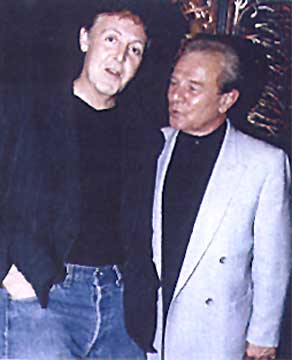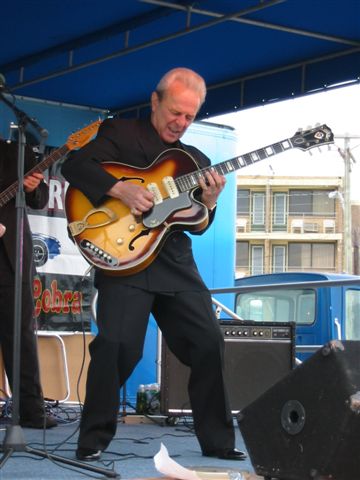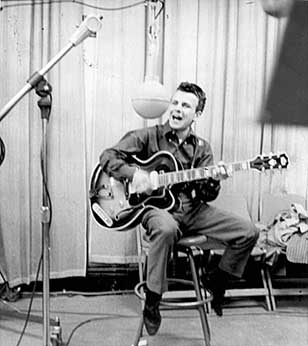Charlie Gracie, Early Rocker Who Hit #1 With ‘Butterfly,’ Dies at 86
by Jeff TamarkinCharlie Gracie, the pioneering early rocker whose 1957 #1 single “Butterfly” provided the Philadelphia-based Cameo-Parkway labels with their first hit, has died. His death, on Dec. 16, 2022, in his lifelong hometown of Philadelphia, was confirmed by the Cameo-Parkway fan page on Facebook. The Charlie Gracie Rock Hall Facebook page, which serves as his official headquarters on the social media site, has not officially announced his passing but said that the page would issue an announcement to fans on Monday. Gracie was 86.
Gracie was highly influential on the ’60s generation of rockers. Paul McCartney covered “Fabulous,” Gracie’s #16 followup to “Butterfly,” and Van Morrison invited Gracie to open for him on a tour. Other admirers included Graham Nash and Stephen Stills: Nash once said that his sister was such a huge fan that when she eyed the singer dropping a cigarette butt on the floor, she picked it up and stuffed it in her pocket as a souvenir. “She still has it to this day,” he said.
Listen: Gracie shows off his guitar skills in a 1957 live recording
He was born Charles Anthony Graci on May 14, 1936, in Philly, on the very same day that fellow hitmaker Bobby Darin was born. Gracie spent his first 10 years living with his grandparents, immigrants from Sicily. When his father suggested he learn an instrument, Gracie chose the saxophone, but his father convinced him to play the guitar instead. Gracie’s talent on the instrument proved prodigious, and he continued to play it when he performed into his later years.

Gracie with Paul McCartney; the ex-Beatle covered Gracie’s hit “Fabulous” on a solo album (Photo from Gracie’s website)
Gracie began to perform locally in his teens, and at 15, he made a series of appearances on the simulcast radio/television program hosted by veteran jazzman Paul Whiteman, who had once been the most popular bandleader in the country. Offered a recording contract by the New York-based Cadillac Records, Gracie cut his first single, “Boogie-Woogie Blues,” which did not chart. Neither did subsequent sides for Cadillac or 20th Century, but when Gracie met a pianist named Bernie Lowe on the set of the Whiteman show in 1956, his career began in earnest: Lowe was launching his own label, Cameo Records, and signed Gracie.
Late that year, at a Philly recording studio, Gracie cut two songs written by Lowe and his partner, Kal Mann, “Butterfly” and “Ninety-Nine Ways.” By April 1957, “Butterfly” was the most-played jukebox record in the country, and aided by appearances on the Dick Clark-hosted local dance program American Bandstand, “Butterfly” rose to the top of the national Billboard chart.
Related: Musicians we lost in 2022

Charlie Gracie performing live in Wildwood, N.J., in the early 2000s (Photo by Jeff Tamarkin, used with permission)
Another Lowe-Mann composition, “Fabulous,” fared well but missed the top 10. Both songs also charted high in the U.K., and Gracie became a star overseas as well. He was unable to follow those initial successes with another hit, however, and due to a squabble with the Cameo executives over royalty payments, he was dropped by the label in 1958, also losing his exposure on Bandstand in the process.
Gracie continued to record for other labels and to perform live, but he never recaptured the fame he enjoyed in the late 1950s. The Cameo-Parkway catalog was not commercially available for many years, and Gracie, therefore, did not enjoy the level of radio airplay that other early rockers did. It wasn’t until 2006, when the ABKCO label finally released a compilation of Gracie’s Cameo-era material, that the original recordings became available once again.
A 2011 single, “Baby Doll,” received some airplay and a new album, For the Love of Charlie, produced by Al Kooper, was also released. Gracie also published an autobiography, Rock & Roll’s Hidden Giant.
Listen to the original Cameo recording of “Butterfly”








No Comments so far
Jump into a conversationNo Comments Yet!
You can be the one to start a conversation.